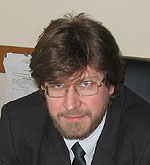© «Russia in
Global Affairs». № 4, October — December 2009
 Europe recently
Europe recently
celebrated the 20th anniversary of the anti-Communist revolution
that put an end to the division of the world into two ideological
blocs. The events of 1989 opened a new chapter in global politics;
however, even two decades later, the full content of this chapter
remains unclear. The fall of the Berlin Wall was not “the end of
history” as proclaimed by some analysts at the time, but the
beginning of a thorny transition to a yet unclear destination.
Russia evaluates the last two decades differently than the rest
of Europe. First, the results of the post-Communist transformation
are very mixed. Many problems have been inherited from the past;
that is, they have never been resolved. Others stem from
developments in recent years. Second, the widespread view in the
West that the world and Europe have become more stable and safer
after the end of the Cold War is not that obvious to Russia. The
years that have passed since the fall of the Berlin Wall can in no
way be described as a period of calm, considering the number of
armed conflicts that have taken place since then, including two
wars that involved nuclear superpowers (in Yugoslavia in 1999 and
Georgia in 2008). Furthermore, the universal security system, which
was talked about so much in the post-Cold War years, has not been
built.
In this issue, Soviet President Mikhail Gorbachev shares his
views on the events of the late 1980s. He is still convinced that
what he did was right because it set a strategy for the development
of his country and the whole world. However, the initiator of the
changes is not satisfied with the way subsequent generations of
politicians both in Russia and the West have used the newly opened
opportunities.
Timofei Bordachev views the events of 20 years ago as a
fundamental demolition of the principles of strategic stability,
which the international system has never regained. Viatcheslav
Morozov analyzes the phenomenon of the European revolution and
tries to understand why it did not put a real end to the division
of Europe. Twenty years later, the dividing line has not
disappeared but has moved eastward, while Russia has not acquired a
new political identity. Lai Hairong points out the importance of
the fall of the Berlin Wall and the breakup of the Soviet Union for
China’s reforms. Beijing has analyzed the mistakes made by European
communist leaders, the author says, adding, however, that not all
the lessons have been learned.
The cataclysms of those times have raised the “Russian issue” –
for the first time in history the Russians are a divided nation,
Igor Zevelev writes. The development of Russia and the stability of
a huge European-Asian territory depend on a realm where Moscow will
look for answers to it. Nikolai Silayev discusses why Georgia
became the first post-Soviet country to find itself in a state of
war with Russia. This is especially surprising as two decades ago
many people in Moscow actively sympathized with the
national-democratic movement in Tbilisi.
Piotr Dutkiewicz explains the emergence of the “Putin model” by
the need for Russia to overcome the acute crisis of its statehood,
which hit the country after the Soviet Union’s collapse. The author
points out, however, that the potential of this model has been
exhausted and that it must be radically reinvented.
Leonid Sedov argues with those who believe that Russian society
wants democratic changes and that it would be enough to just not
stand in the way of healthy instincts. In the sociologist’s view,
the national characteristics that distinguish Russians from other
post-Communist nations are not conducive to changes in the
country.
Vadim Smirnov writes about the unusual fate of Kaliningrad, a
Russian region which the cataclysms of the late 20th century have
turned into an isolated “island” within the European Union.
Yevgeny Savostyanov advocates a strategic alliance between
Russia and the United States. The author believes that the two
countries must implement what Gorbachev failed to do 20 years ago,
despite the burden of mutual grievances and misunderstanding.
Alexander Oreshenkov draws the reader’s attention to the Arctic, a
new region of international interaction that could become a place
of rivalry or a place of cooperation. Russia and the U.S. are key
players in this region.
Fyodor Shelov-Kovediayev writes about the degradation of the
capitalist development model, which 20 years ago was believed to
have no alternatives. The global financial crisis has shown that
this model has exhausted itself and that new market principles
should be formulated. Leonid Grigoriev and Marsel Salikhov argue
that the financial crisis of 2008-2009 has not been deep enough to
change the development paradigm and that the “new” world will be
very much like the “old” one. Vyacheslav Kopiev insists that
tourism is the industry that can become the locomotive of the
economy. Russia has a special potential in this sector and can take
advantage of the opportunities offered by the country’s openness
achieved in the early 1990s.
Our next few issues will continue to analyze the last two
decades of change, especially as post-Soviet countries are entering
a period of notable anniversaries. Our other topics include the
transformation of the Army, security and the future of negotiations
on nuclear disarmament.










